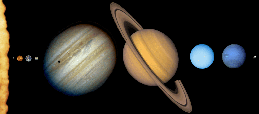
-
Prof: Doug Hamilton
Phone: (301) 405-1548
Email: hamilton@astro.umd.edu
Office: CSS 1245
Office Hours: Drop by Anytime!
Textbook: Planetary Sciences by I. de Pater and J.J. Lissauer
Webpage: http://www.astro.umd.edu/~hamilton/ASTR688R

This course will survey the science of our planetary system with an emphasis on those aspects that help us understand its origin and connection to other planetary systems. According to the authors, the amount of material in the textbook "is difficult to cover in a one year graduate-level course", so we will choose topics selectively to fit into one semester. Given that we will be covering a lot of material in a short amount of time, students will get the most out of class lectures if they read and think about the relevant book chapters before we cover them in class.
Topics to be covered will include planetary atmospheres, surfaces, and interiors and the small bodies of the Solar System (asteroids, comets, Kuiper-belt objects). We will consider the dynamics of these bodies, their physics, and their chemistry. Dynamics will be emphasized and will include, for example, discussions of resonances, migration of the planets within gaseous disks, and scattering of comets into the Oort cloud. Physics will include hydrostatic equilibrium, equations of state, thermal conductivity, heat generation, and so on. Chemistry will emphasize determination of abundances in both planetary and cometary atmospheres.
The major topic covered in the text that we will not cover during the course is planetary magnetospheres (Ch. 7). It will likely be necessary, due to time pressures, to minimize the time spent on atmospheres and rings. Similarly, planetary surfaces will emphasize those aspects that tell us about formation and evolution - active vs. inactive interiors, cratering, etc. The syllabus will be maintained online, and will be updated frequently as the semester progresses. So, for example, although meteorites and comets are currently scheduled for two lectures each, it may be necessary to drop one or more of these lectures to better cover other topics.
Students should expect an in-class midterm and final exam, and about five homework assignments, largely but not exclusively drawn from the text. There will also be a class project with an oral presentation due toward the end of the semester.
 Return
to ASTR688R Home Page
Return
to ASTR688R Home Page